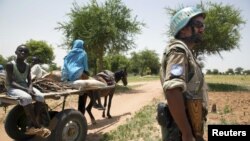NEW YORK — The United Nations Security Council on Tuesday extended the mandate for the U.N.-African Union peacekeeping force in Sudan's Darfur region, but the Council voted to reduce the number of U.N. troops and police in Darfur.
The Security Council resolution extends the Darfur peacekeeping operation for a sixth year, but during the next 12 to 18 months reduces the number of troops from 19,000 to 16,200. The council also voted to cut the number of U.N. police in Darfur from about 3,700 to about 2,300.
In a recent report, U.N. Secretary-General Ban Ki-moon said the U.N. operation in Darfur, known as UNAMID, continues to contribute to the protection of civilians and facilitate the delivery of aid to vulnerable populations. Ban said that in the years since the deployment of the mission, the security situation in Darfur has improved.
The Security Council resolution was approved by 14 of the council’s 15 members with Azerbaijan abstaining. The country’s ambassador said that the council’s discussions on the resolution had not been sufficiently open.
Guatemala’s representative, Gert Rosenthal - who voted in favor of the resolution - objected to the inclusion of a paragraph asking the UNAMID peacekeepers to share information about the Lord’s Resistance Army. The rebel group, formed in Uganda during the late 1980s, has moved its activities into neighboring states.
Rosenthal said he had serious reservations about that paragraph.
“The objective information from the secretariat of this organization does not provide a basis for believing that there is an involvement of the Lord’s Resistance Army in the zone covered by UNAMID,” he said.
Sudan’s ambassador, Daffa-Alla Elhag Ali Osman, also objected to the reference to the Lord’s Resistance Army, or LRA, saying that there was no reference in the resolution to anti-Sudanese rebel groups that, he said, are based in South Sudan.
”Is that logical? We will continue to work with UNAMID within its traditional mandate," Osman said. "We have strong reservations regarding inclusion of LRA and we will monitor the situation.”
British ambassador Mark Lyall Grant told reporters that the reference in the Security Council resolution to the Lord’s Resistance Army does not change the mandate of the UNAMID peacekeepers.
“We have exactly the same objective as the government of Sudan, which is that the LRA should play no role whatsoever and should be completely absent from Darfur,” he said.
Lyall Grant added that there is no evidence of LRA activity in Sudan. He also said the Security Council is concerned about the Sudanese government’s restrictions on the movement and operations of UNAMID peacekeepers and humanitarian agencies, and called on the government to lift the restrictions immediately.
UNAMID was established in 2007 with the primary mission of protecting civilians. Rebels in Darfur have been fighting the Sudanese government since 2003.
The Security Council resolution extends the Darfur peacekeeping operation for a sixth year, but during the next 12 to 18 months reduces the number of troops from 19,000 to 16,200. The council also voted to cut the number of U.N. police in Darfur from about 3,700 to about 2,300.
In a recent report, U.N. Secretary-General Ban Ki-moon said the U.N. operation in Darfur, known as UNAMID, continues to contribute to the protection of civilians and facilitate the delivery of aid to vulnerable populations. Ban said that in the years since the deployment of the mission, the security situation in Darfur has improved.
The Security Council resolution was approved by 14 of the council’s 15 members with Azerbaijan abstaining. The country’s ambassador said that the council’s discussions on the resolution had not been sufficiently open.
Guatemala’s representative, Gert Rosenthal - who voted in favor of the resolution - objected to the inclusion of a paragraph asking the UNAMID peacekeepers to share information about the Lord’s Resistance Army. The rebel group, formed in Uganda during the late 1980s, has moved its activities into neighboring states.
Rosenthal said he had serious reservations about that paragraph.
“The objective information from the secretariat of this organization does not provide a basis for believing that there is an involvement of the Lord’s Resistance Army in the zone covered by UNAMID,” he said.
Sudan’s ambassador, Daffa-Alla Elhag Ali Osman, also objected to the reference to the Lord’s Resistance Army, or LRA, saying that there was no reference in the resolution to anti-Sudanese rebel groups that, he said, are based in South Sudan.
”Is that logical? We will continue to work with UNAMID within its traditional mandate," Osman said. "We have strong reservations regarding inclusion of LRA and we will monitor the situation.”
British ambassador Mark Lyall Grant told reporters that the reference in the Security Council resolution to the Lord’s Resistance Army does not change the mandate of the UNAMID peacekeepers.
“We have exactly the same objective as the government of Sudan, which is that the LRA should play no role whatsoever and should be completely absent from Darfur,” he said.
Lyall Grant added that there is no evidence of LRA activity in Sudan. He also said the Security Council is concerned about the Sudanese government’s restrictions on the movement and operations of UNAMID peacekeepers and humanitarian agencies, and called on the government to lift the restrictions immediately.
UNAMID was established in 2007 with the primary mission of protecting civilians. Rebels in Darfur have been fighting the Sudanese government since 2003.




